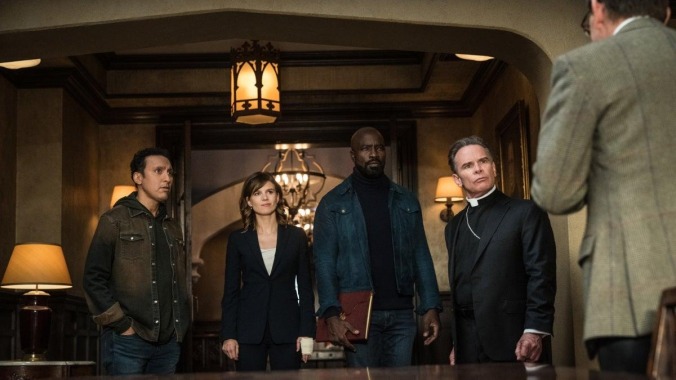Evil’s superb 2nd season is worth signing up for yet another streaming service
After moving from CBS to Paramount Plus, Robert and Michelle King's drama is still riveting and spooky

Created by husband-wife duo Robert and Michelle King, Evil is an immensely fun supernatural drama as well as an incisive series that examines its occult subject matter through the lens of both faith and science. It looks at seemingly inexplicable occurrences from paranormal and psychological perspectives, as Catholic seminarian David Acosta (Mike Colter) and his technology expert Ben Shakir (Aasif Mandvi) team up with psychologist Dr. Kristen Bouchard (Katja Herbers) for case-of-the-week episodes to assess whether their clients might be possessed or recipients of a miracle.
Despite this formulaic approach, Evil refrains from turning into a predictable procedural. It gradually digs into its supernatural territory—possible exorcisms, ghostly dreams, a ghoul baby—while keeping viewers guessing about the existence of these phenomena, instead using them to flesh out the characters’ psyches. Season two moves from CBS to Paramount+ (yes, it’s another subscription service; yes, Evil is worth it) and sharpens the focus on the deep-rooted impact of evil, be it otherworldly or man-made.
David is unwavering in his belief in God, so much so that he uses hallucinogens to try and communicate with the big guy. Now he uses those methods to try to connect with a vision of Archangel Michael, and seeks help from a new character, Sister Andrea (Andrea Martin). Ben and Kristen’s conviction still lies in science and rational explanations, ranging from mental illness to faulty walls and pipes, for supposed hauntings. Evil is compelling because the trio’s conflicting ideologies are challenged with every case, especially as Ben and Kristen’s work finally catches up to them. The season-one finale, “Book 27,” implied that Kristen may be evil herself after a holy cross leaves a burn mark on her palm.
From the first shot of the season-two premiere, “N Is For Night Terrors,” the show leans into this idea while sticking to a blueprint of keeping up the speculation. Did the burn happen because she’s devilish or is it just because the cross’ cobalt material heated up, as Ben suggests? Or is it because she might have bludgeoned serial killer Orson LeRoux (Darren Pettie) for threatening her family, and her guilt manifests as various visions, including one of a demon with a burning head?
If Evil season one commented on the varying natures of evil, the sophomore season scrutinizes the innate fears that develop as a result, especially when the team is pushed by their adversary, Leland Townsend (Michael Emerson). Leland becomes a client, requesting an exorcism for selling his soul to the devil. He uses this opportunity to interact with everyone to bring their fears to the surface. He tells Ben, a stanch non-believer, to expect a visitor at night and, bam, a she-devil starts haunting his dreams, akin to Kristen being terrorized by a creature named George. But is Ben’s brain just playing tricks after hearing Leland out?
Once again, Evil smartly plays with these themes without revealing the truth. Leland’s main target is David, who turns into a sponsor-like figure for him, thus setting up the ultimate good versus bad showdown. Leland is obviously nefarious with an unknown agenda, but his increased involvement leads to spectacular scenes, thanks to Emerson’s astounding performance. Lost’s Ben Linus walked so Leland Townsend could run. The actor revels in morphing his facial expressions and pacing his dialogue delivery to go from absurd to hilarious to scary. He brings levity to even the most serious and spooky moments without ever making anyone forget he is the creepy villain here.
The rest of the cast is equally noteworthy. Herbers’ is charming and effortless in bringing Kristen’s gray characteristics to life. Colter and Mandvi are both captivating, especially the latter, who delivers on the meatier storylines now that Ben ponders more about his faith, as in episode 3, “F Is For Fire.” Their client is a young girl who is the adopted daughter of a Muslim woman and a Catholic man, and each parent wants to approach a possible exorcism for their daughter according to their own religion. Ben’s Islamic faith comes into play as he offers guidance about the myths of a djinn. But “E Is For Elevator” is the strongest of the four episodes made available for review. Much like how season one’s “Rose390” solidified that Evil can deliver on the scare factor, “E Is For Elevator” ups the ante as the team investigates how two people disappeared while playing the elevator game, an apparent gateway to the doors of Hell. It’s an emotional outing for Ben, a fearful one for Kristen—whose four loud daughters also get involved—and an introspective one for David.
The Kings skillfully weave real-life issues into their shows like The Good Wife and The Good Fight. Evil is no different, despite its genre. Under the guise of its supernatural elements, the show looks empathetically at the trauma caused by racism in the medical field or by deportation. “E Is For Elevator” expands on this as David deals with being one of only 250 Black Catholic priests in the country. This tackling of current affairs helps anchor the show’s risky teetering on the edge of reality and fantasy. Evil doesn’t commit to confirming the existence of a demon hierarchy trying to take over Earth through the RSM fertility clinic, but it does show how the clinic’s corruption disturbs Kristen, who was treated there, and how it led to the birth of her daughter, Lexis (Maddy Crocco). At some point soon, Evil may have to start giving solid answers (truly, is Leland serving Satan or does he need to be treated for narcissism and other mental health disorders?), but while exploring the ramifications of possible paranormal activity, Evil season two proves isn’t to be missed.